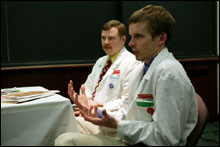
Those are Boston University medical students Chen Kenyon (right) and Dustin Petersen in the photo, who are among the thousands who oppose accepting personal gifts from pharmaceutical companies. And their movement is quietly touching off discussions on ethics in the industry and making other medical professionals think.
Kenyon and Petersen are among a growing band of stethoscope-wearing students who believe the medical profession needs more detachment from big pharmaceutical firms.
Consequently, they're turning down everything from free catered meals to notepads, provoking debates among fellow students and quizzical looks from doctors.
"People will often ask, 'why didn't you take the pen? Or, why didn't you eat the lunch?'," says Kenyon, a Boston University medical student who packs a sandwich, apple, and granola bar almost every day so he won't have to eat meals sponsored by drugmakers.
Behind the modest rebellion is the belief that taking gifts from drug companies creates a conflict of interest for doctors. The argument: To accept handouts is to feel indebted, and doctors indebted to drug firms may not be prescribing medicines based solely on what's best for their patients. The 60,000-member American Medical Student Association (AMSA) urges students and doctors alike to just say "no" to all personal gifts from drugmakers.
Against this backdrop, students are still convinced their cause is worth fighting, even if it means giving up a hot meal every day. "I don't think patients can trust us anymore," says Kristin Rising, a medical student at the University of California, San Francisco. "By accepting gifts, we're taking in biases that are going to affect patient care."
A pill they won't swallow | Correspondent of The Christian Science Monitor
1 comment:
Yep! It's a positive development and I hope their numbers increase. =)
It'll be good for the medical professionals and for the patients.
Post a Comment